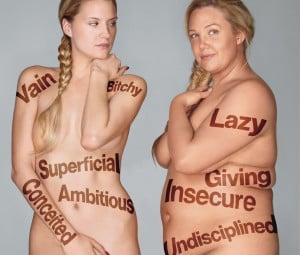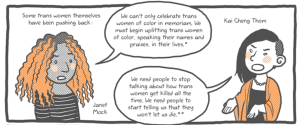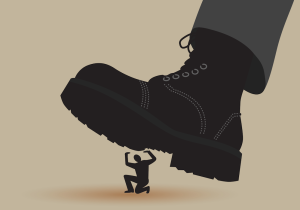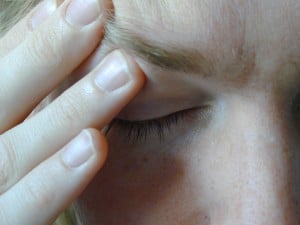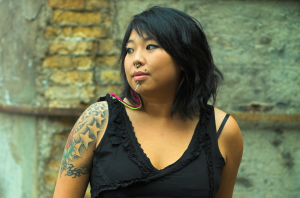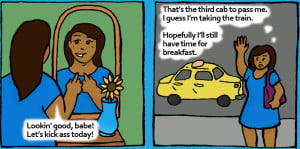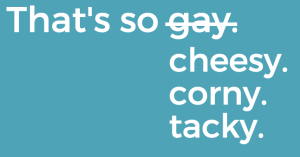It’s important that feminism, as a movement, is fighting for the rights of moms.
After all, mothers are constantly under attack in our society – and so is the right of women to decide whether or not they want to be them at all.
But sometimes, conversations around the rights and needs of moms center on moms of privilege: white mothers, wealthy and middle-class working mothers, and mothers with supportive (and mostly straight) partners.
And when that happens, we’re ignoring the moms who struggle the hardest against the kyriarchy (the social system that keeps all intersecting oppressions in place) to raise their kids.
That’s not okay.
Marginalized moms – single moms, moms of color, poor moms, queer moms, and other moms who raise kids at the intersections of oppression – face unique and serious challenges to their families and personhood every day.
Single moms are raising kids in a country that’s hostile to their ability to thrive.
Queer moms are fighting for the right to start their families or keep them together.
Moms of color are more at risk to have their kids taken away by the state.
Poor moms are being pushed further and further away from survival by slashes to the social safety net.
Those moms need our support.
A huge part of intersectionality is attempting, as a movement, to craft solutions that lift up the most marginalized folks in our communities. That means fighting not just for all moms, but specifically for marginalized moms.
That means paying attention to, and acknowledging, the hardships marginalized moms face, and making sure that our work to support moms reflects those hardships.
Often, feminists talk about “reproductive justice” – a term coined by women of color that refers to the fight not only for abortion and birth control access, but also cultural changes in how we support reproductive rights more broadly.
Reproductive justice is about working not only for legal abortion, but for more accessible abortion and birth control for low-income people and communities of color. It’s about fighting for comprehensive sexuality education and an end to sex-shaming.
And reproductive justice is also about making sure all mothers have the ability to raise their kids safely and on their own terms – that they feel supported socially, have the resources and opportunities to make ends meet, and don’t face discrimination and harassment at work, at home, or in public.
For marginalized moms, reproductive justice is about the rights of their families to survive and thrive. And as feminists, that’s our fight.
We can all support marginalized moms, whether we’re doing so by pushing for policy changes, changing our own behavior, or helping to bust the myths and stereotypes that fuel their oppression.
Here are five ways, just to start.
1. Stop the Mom-Shaming
Mom-shaming is way too pervasive in our culture.
For moms who live at the intersections of oppression, shame and stigma come with pregnancy, childbearing, and childrearing.
Our culture’s idea of an “ideal mom” is steeped in unrealistic expectations, old-school gender roles, and other elements of the kyriarchy.
Moms are under enormous pressure every day to be perfect, and the expectations put on them by our culture are derived from the same classist, racist, heterosexist bullshit we rally against as feminists.
When moms don’t meet our society’s outrageous standards, our culture is quick to shame them.
Moms today are shamed for having kids too early or too late, for raising kids in nontraditional families, and for teaching their kids their native languages.
Moms are taught not to ask for help, not to look or act tired, and not to acknowledge or voice feelings of frustration or sadness related to their jobs as parents.
Moms are shamed for being poor, or single, or busy and wanting families anyway. Moms are attacked for raising kids in the only neighborhoods they can afford, hiring nannies or babysitters so they can go to work, buying snacks that aren’t organic.
It’s ridiculous. And it’s the kind of thing that impacts moms at the intersections and margins way worse than it impacts moms of privilege.
It is true that moms of privilege are shamed, too: for buying the “wrong” snacks, for hiring nannies and babysitters, for burning out. And it’s true that some of the shame and stigma moms feel isn’t about class, or race, or other lines of identity.
But for marginalized moms, shame and stigma have a disproportionate impact.
It’s shame and stigma that reinforce a culture where welfare and food stamps are constantly embattled, leaving the moms who rely on those programs – moms who are poor and overwhelmingly of color – struggling with food insecurity.
It’s shame and stigma that allow organizations to flat-out discriminate against queer parents and would-be-parents.
And it’s stigma and shame that forces moms living at the intersections of oppression to try even harder to meet that impossible ideal for all the other moms – even though it’s even further from reach for them every day.
2. Reject Stereotypes and Myths About Marginalized Moms
There’s a whole lot of messed-up cultural conversations about marginalized moms that happen all the time.
And in the early ‘90s, some of them were about me.
I grew up with a single mom, and thus I was a walking, talking myth-buster. People sincerely “worried” about my brother and me, as if growing up with one stable and loving parent was putting us at risk for a lifetime of hardship.
It was true that we faced financial hardship together as a family, but that wasn’t what people found troubling.
Instead, people were worried that we lacked a strong father figure, and it would ruin us for life. They worried that we would become drug addicts or dropouts. They saw us as statistics, rather than actually focusing on ways to support our family.
Because of that experience, I’ve tried hard my whole life to ward away mom-bashing myths that shape our culture.
I refuse to buy into the notion that queer parents are child abusers.
I refuse to buy into the notion that no young parent can be a good parent.
I refuse to buy into the notion that poor people have kids as a way to suck money away from the government.
I refuse to buy into the notion that kids who live with parents in neighborhoods that are underserved or of color have no shot of achieving their dreams.
I know better than to think single moms aren’t great moms.
And you know what? It’s okay that I don’t believe that stuff. Because that stuff isn’t real.
Queer parents raise happy, loved kids. Poor people start families for the same reason people with more means start families. Single moms can be great moms, and so can young moms.
And just because someone parents in imperfect conditions doesn’t mean their children have no chance of making their own way for themselves.
Stereotypes about single moms, moms of color, queer moms, and other marginalized moms are part of a vicious cycle of discrimination – and it’s up to us to stop it in its tracks.
Myths about how poor people or people of color or queer people are “unfit” mothers make it easier for our culture to abandon those parents – and make it harder for us to band together and fight for them.
And while those ideas are the result of oppression and marginalization, keeping them alive also makes that oppression and marginalization stronger.
It’s on us to know better than to buy into harmful myths and stereotypes about anyone – and especially about other women. And doing so is a huge step toward letting marginalized moms reclaim their own narratives.
3. Check Your Own Privilege
It’s easy for us to think we know better. And when you’re raising a kid, everyone thinks they know better.
The Internet and our culture at large seem to have all the answers for moms and would-be moms. But what works for one person, or helps one person, isn’t going to be a universal solution.
And too often, people who think they’re helping moms out, by showing them a “better” way to raise their kids, are actually just denying marginalized moms – like queer parents and moms of color – an opportunity to raise their kids outside of harmful, mainstream discourse.
Parenting advice and expectations come from a place of privilege.
Class privilege shapes the list of things we think all moms should have: diaper changing tables, high chairs, brand-new baby clothes, top-of-the-line car seats. And it stops us from supporting moms who need help obtaining those things. Because it lets other moms – and the rest of us – think, “Well, I knew better.”
White privilege shapes the narrative of what we’re supposed to teach our kids, and how. From what they’re wearing to what they’re reading and watching on TV, white supremacy shapes the lives of kids of color. And their parents are implicitly told, by our culture, to buy into it.
Heterosexist privilege lays the foundation for how kids are supposed to be raised: with one mom, and one dad, each of whom are cisgender and hegemonically align with their gender. That same privilege attaches stigma to the notion of parenting while openly gay or trans, and perpetuates a culture where queer families live in fear of harassment.
The advice we often dole out to marginalized moms originates in a place of privilege that clashes with their values and actual experiences.
And when we do so, we perpetuate the conversations about parenting that fuel myths and stereotypes and shame marginalized moms. By explaining away marginalization, we avoid looking it dead in the face.
It’s time for us to own up to our own privilege and stop centering our experiences – because marginalized moms deserve to do it their way, 100%.
4. Support Programs That Help Marginalized Moms and Their Kids
Because marginalized moms are — well — moms, they benefit from a lot of the stuff that every mom benefits from: social programs in government and local communities that help parents share time and tasks, community-oriented service groups that help kids get involved in changing their worlds, and emergency resources like shelters and toy and supply drives that parents from all stripes may rely on one day.
For marginalized moms, support systems in place can make a huge difference in evening the playing field.
My single mom depended on after-school programs that gave kids a few more hours after school to work on assignments and study for tests. Free or affordable programs like the Girl Scouts let me engage with my community and larger issues in our culture without putting my mom out.
For some moms, though, these programs do a lot more than ease their burden: They change their lives.
Poor moms can put food on the table because of programs like welfare and SNAP, and they get to take their kids to the doctor because of Medicaid expansion under the ACA.
Moms who are also survivors of domestic violence can find their kids a safe place to stay, so long as shelters in their community don’t shutter.
Supporting the support systems already in place for different kinds of families and moms at large matters. And the impact that it has on the moms who need support most is invaluable.
5. Push for Legislation and Policy Changes That Lift Up Marginalized Moms
Unfortunately, many of those programs don’t go far enough, and we’ve got a lot of work to do to end inequality among different kinds of moms – and for moms overall.
We live in a country where some people still don’t get maternity leave. We live in a country where parents can’t afford childcare, and there aren’t any government resources at play to help them close the gap.
We live in a country where getting pregnant, for moms who work hourly positions, can mean losing a paycheck – and even a job. We live in a country where hardworking moms aren’t given the ability to control their own schedule so they can take care of their kids.
And we live in a country where queer moms can’t always start families, poor moms and moms of color live in fear of their families being torn apart by the state, and poor and single moms are struggling to survive.
Moms aren’t equal – not yet.
Not in a society where having a kid means a pay cut for women and a pay raise for men. Not in a society where working single moms are more likely to live in poverty. Not in a society that shames single moms, foreign moms, trans and queer moms, teen moms, older moms, working moms, stay-at-home moms, Black moms, Latina moms, Native moms, Asian moms.
And fixing these disparities requires an intersectional approach.
It means raising the minimum wage, and therefore lifting up the families who live below the poverty line because their breadwinners work low-wage jobs. It means demanding equal pay, no exceptions. It means strengthening anti-discrimination laws and healthcare laws so that all families have equal rights and opportunities.
It means ending legal disparities between how women of color and white women fare in the childcare services system. It means ending police violence and the new Jim Crow. It means shutting down racist stereotypes, sexist stereotypes, homophobic stereotypes, xenophobic stereotypes.
It means helping parents access childcare they can afford, alongside a secure social safety net. It means paid leave for everyone. It means passing the Pregnant Workers Fairness Act, and then making healthcare more accessible to people – and parents – who are unemployed. It means comprehensive education programs for everyone that give all moms the chance to watch their kids succeed.
Do you see where I’m going with this?
Lifting up moms is connected to the work we do to lift up everyone else.
And we need to remember that, and honor it, in our work. Because if lifting up workers, and people of color, and women means lifting up moms, then remember: Lifting up moms means lifting up workers, and people of color, and women.
We all win when moms win.
***
Standing up for a supporting marginalized moms is a revolutionary act.
It means smashing patriarchy, white supremacy, and homophobia. It means advocating for the people who live at the margins. It means demanding that our future be centered on the needs of those who live at the intersections.
When we advocate for moms, we, as feminists, owe it to ourselves to do so in the most intersectional way possible: from the bottom up. Only then will we carve out a movement in which all moms really are welcome – and taken care of, too.
[do_widget id=’text-101′]
Carmen Rios is a Contributing Writer for Everyday Feminism. She splits her time disparately between feminist rabble-rousing, writing, public speaking, and flower-picking. A professional feminist by day and overemotional writer by night, Carmen is currently Communications Coordinator at the Feminist Majority Foundation and the Feminism and Community Editor at Autostraddle. You can follow her on Twitter @carmenriosss and Tumblr to learn more about her feelings.
Search our 3000+ articles!
Read our articles about:
Our online racial justice training
Used by hundreds of universities, non-profits, and businesses.
Click to learn more






